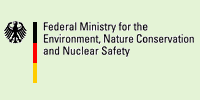Potsdam, 14 Dec. 2004
A report launched today at
the tenth UN Climate Conference in Buenos Aires (COP 10) highlights the
dangerous consequences and risks for many regions, ecosystems and human
cultures if global mean temperature is allowed to rise above 1.5-2°C
over pre-industrial levels. The report published by the European
Climate Forum (ECF) and the Potsdam Institute for Climate Impact
Research (PIK) outlines the initial results of a major scientific
Symposium on key regions and their vulnerability to climate change
which was held in Beijing 27-30 October 2004 and attended by over sixty
scientists, stakeholders and policy makers from more than 20 countries.
The
aims of the Beijing Symposium were to identify the projected effect of
climate change in a selected set of regions and stimulate scientific
and political discussion and a dialogue as to what levels of climate
change are `tolerable and what might constitute dangerous levels of
change'.
Bill Hare from PIK who organized the scientific content
of the Symposium says "The report details potential loss of cultures,
extinction of species and ecosystems, risks of major water and food
security threats, exacerbation of regional disputes, and large scale
displacement of people when global warming exceeds a few degrees above
pre-industrial levels."
According to the report climate change
could have disastrous consequences for South Asia, causing social
unrest and creating environmental refugees. A global warming of around
2.5°C was felt to be potentially dangerous for food security in India
if associated with significant reductions in the amount of
precipitation and changes in timing. A similar level of warming was
associated with potentially dangerous and rapid increase in flood risk
in Bangladesh.
In China, a 2.5-3°C increase of global mean
temperatures over pre-industrial levels could reduce rice yield by
10-20% under worst case assumptions on CO2 fertilisation, while in
Southern Africa a 2-2.5°C warming could significantly increase the risk
of commercial crop failure. In some regions where fish provides a major
source of protein, such as Malawi, a similar increase in temperature
could virtually eliminate the primary source of protein for almost 50%
of the population.
In the Arctic summer sea ice projected to be
lost for a global mean warming of roughly 2.5°C above pre-industrial
levels which will push polar bears, walruses, some marine birds and
certain types of seals towards extinction. The traditional Inuit
hunting culture is endangered and its destruction appears very likely
if warming continues.
Prof. Carlo Jaeger from PIK, Chairman of
the ECF and one of the organizers of the Beijing Symposium, says "I
believe that this report shows that long term global temperature
increases of more than 2 degrees above pre-industrial levels
constitutes dangerous interference with the climate system. This can
lead to sea-level rise of several meters and involve a whole range of
major risks to human well-being and environmental integrity. These are
the kind of dangers that must be avoided according to Article 2 of the
UN Framework Convention on climate change."
Also under threat
for warming above 1.5-2°C are the Australian Alpine region, coral reefs
on the Great Barrier Reef and World Heritage Rainforests.
In
Western China glaciers are expected to disappear by 2100, but glacial
retreat will jeopardise water security during the dry season long
before then and in Peru glacial retreat will affect food security and
power generation - almost 70% of power generation in Peru is
hydro-electric. Water supply for the capital of Peru, Lima is
threatened if warming and drying continues and there are no solutions
clearly in sight.
There appears to be a grave danger that the
Amazon region is at risk from the combined effects of climate change
and land clearance, forest fragmentation and fire. Over the next
several decades there is a risk of an abrupt and irreversible flip in
the ecosystems of the region from forests to savannah with large-scale
loss of biodiversity and loss of livelihoods for people in the region.
For
California, warming of slightly more than 2°C is projected to lead to a
30-70% loss in snow pack suggesting a loss of 13-30% of California's
water supply in the absence of massive increases in water capture and
storage capabilities.
Bill Hare from PIK says "The scale and
magnitude of the risks identified in the Beijing Symposium for levels
of global mean warming of around 1.5-2°C add to the urgency of the need
for an international debate over acceptable limits to human induced
climate change."
This press release and the report in English
can be found on www.european-climate-forum.net. Translations into other
languages of the summary of the report will become available after the
14th of December on the same website.
Contact information in Buenos Aires:
Prof. Carlo Jaeger Tel. 15 50015953 (outside Argentina +54-911-50015953)
Bill Hare Tel. 15 56380349 (outside Argentina +54-911-56380349)
Antonella Battaglini Tel. 15 5771 7676 (outside Argentina +54-911-57717676)
In Europe:
Anja Wirsing (PIK)
anja.wirsing@pik-potsdam.de
Tel. +49-(0)331-288-2507
Dr. Martin Welp (ECF)
martin.welp@pik-potsdam.de
Tel. +49-(0)331-288-2619
The Peking Symposium and the report presentation at COP 10 were generously supported by


![]()






